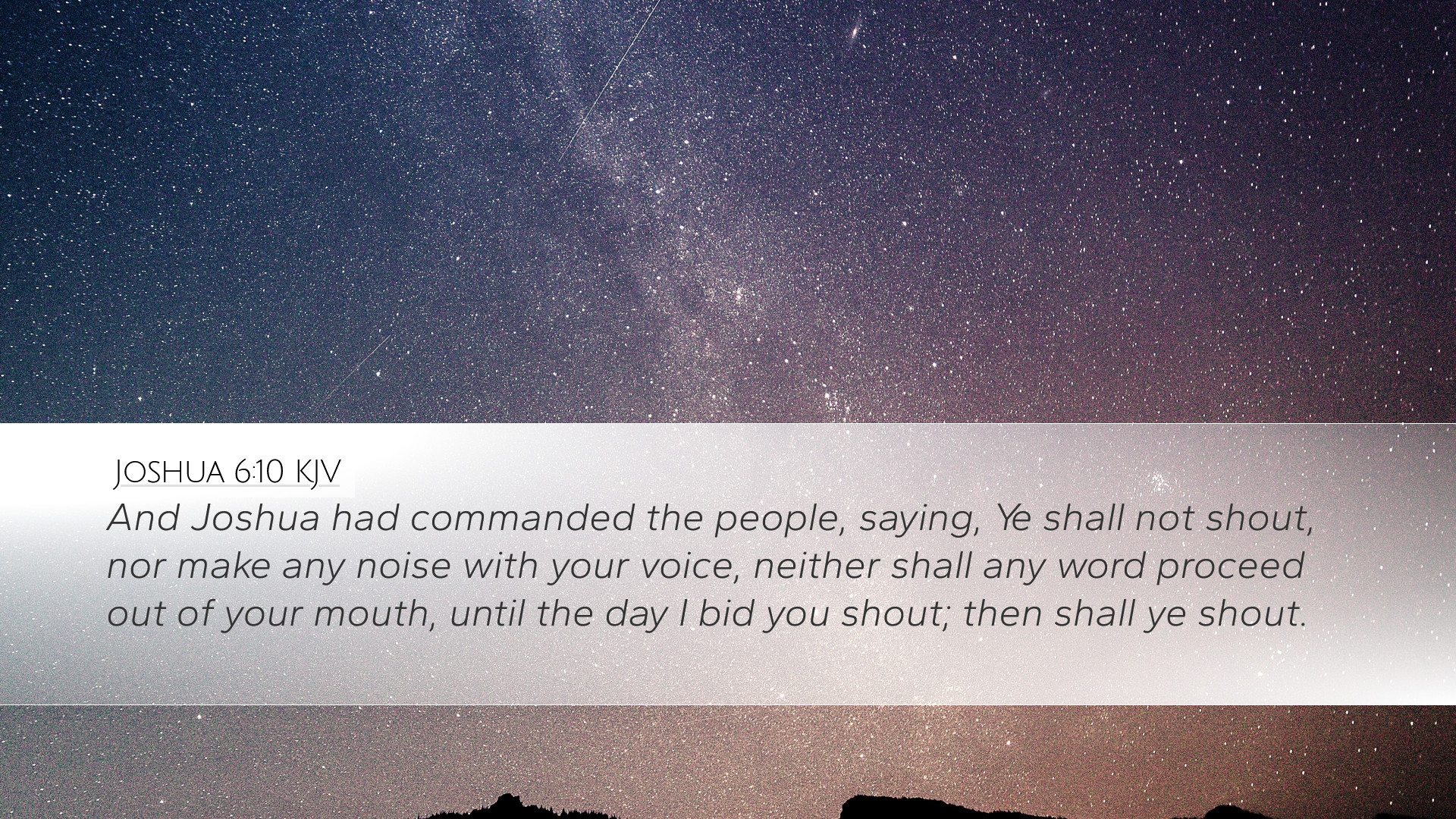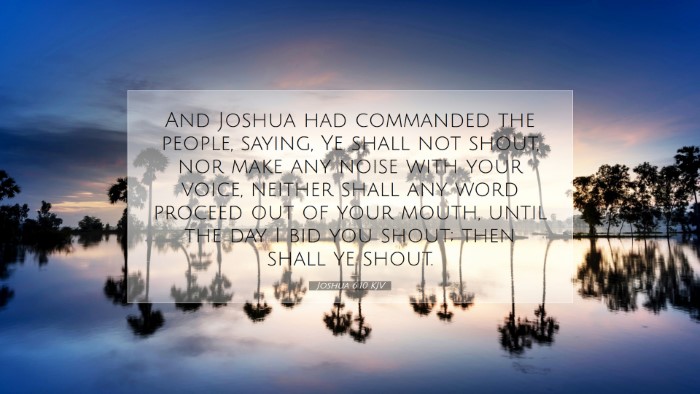Commentary on Joshua 6:10
The verse Joshua 6:10 states: "But Joshua had commanded the people, saying, 'You shall not shout or make any noise with your voice, nor shall a word proceed out of your mouth, until the day I say to you, “Shout!” Then you shall shout!'"
Introduction
This directive from Joshua reflects a methodical approach to the conquest of Jericho, emphasizing obedience and faith in God’s strategy. Commentaries from public domain scholars such as Matthew Henry, Albert Barnes, and Adam Clarke illuminate the significance of this verse within the larger narrative of the Israelites’ journey into the Promised Land.
Analysis of the Verse
Joshua’s Command
Matthew Henry highlights the importance of authority in Joshua's command, illustrating his role as a leader chosen by God. His prohibition against shouting until the designated time symbolized total obedience to divine instruction, which is a key theme in the Israelites' journey.
The Role of Silence
Albert Barnes comments on the significance of silence. He posits that in many biblical contexts, silence can be indicative of inner preparation and an expression of faith. By withholding their voices, the Israelites exhibited trust in Joshua’s leadership and the forthcoming victory that God had promised.
Faith and Obedience
Adam Clarke emphasizes the profound theological implications of obedience present in this command. To the natural mind, staying silent while marching around an imposing fortress would appear absurd. Nevertheless, this act of faith—entrusting their victory to God's timing—mirrors the obedience expected of believers in various situations of life.
The Context of Jericho's Conquest
The backdrop of this narrative is the miraculous crossing of the Jordan River and the preparations for battle against the fortified city of Jericho. Here, the silence commanded by Joshua serves as a contrast to the impending shout of victory:
- Preparation for Battle: The silence is part of the preparation of Israel to ready themselves for something beyond human ability.
- Spiritual Warfare: The instructions provided by God through Joshua encapsulate the essence of spiritual warfare, where trust in God’s methodology supersedes human rationale.
Theological Insights
The silence mandated by Joshua bears rich theological insights applicable to contemporary believers:
- The Power of God’s Timing: The eventual command to shout symbolizes the importance of waiting for God’s timing in our lives.
- Active Faith: Faith requires action aligned with divine directives, even when the logic is not apparent.
- Unity in Purpose: The collective silence underscores the necessity of unity within the body of believers as they follow God’s direction.
Insights from the Commentators
Matthew Henry's Perspective
In his commentary, Matthew Henry elucidates that the silent march signifies faith, noting that the silence was not born out of despair but out of hopeful anticipation of deliverance. He argues that this disciplined obedience leads to spiritual victory.
Albert Barnes' Reflection
Albert Barnes interprets the command to remain silent as an invitation to meditate on God’s power and promises. He implies that silence serves as a strategic tool in spiritual preparation, fostering a deeper relationship with God, enabling spiritual clarity and focus.
Adam Clarke's Commentary
Adam Clarke's analysis underscores that the silence imposed upon the people imbued them with a heightened sense of expectation. By waiting patiently, the Israelites demonstrated their faith in God's deliverance, which was ultimately rewarded.
Application for Today’s Believers
The principles drawn from Joshua 6:10 resonate powerfully for pastors, students, theologians, and Bible scholars, urging them to consider the following applications:
- Embrace Silence: In a culture often dominated by noise, taking moments of silence can enhance one’s focus on prayer and reflection on God’s word.
- Follow God’s Plan: Believers are urged to adhere strictly to God’s guidance, even when it seems unusual or counterintuitive.
- Prioritize Unity: Engaging in a collective effort to listen to God can create a stronger community that is more aligned with His will.
Conclusion
Joshua 6:10 serves as a profound reminder of the interplay between obedience, faith, and the divine's ability to orchestrate victory in seemingly impossible circumstances. The insights derived from respected commentaries not only enrich our understanding of this passage but also provide vital lessons applicable for believers striving to walk faithfully with God.


